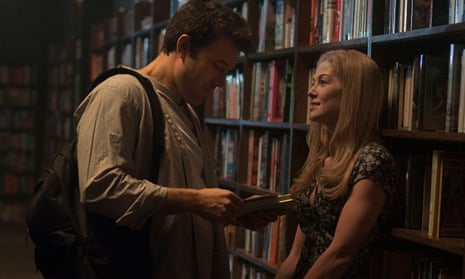The last time David Fincher took a stab at a bestselling potboiler with an enigmatic femme fatale, the disappointing result was The Girl With the Dragon Tattoo, an eye-catchingly stylish but thematically empty (and, frankly, unnecessary) English-language remake of an entirely serviceable Danish/Swedish hit. Now, with this grippingly caustic adaptation of Gillian Flynn’s bifurcated novel (which the author has brilliantly adapted and reconfigured for the screen), Fincher is back on form, mixing the forensic procedure of Zodiac with the playful high-gloss sheen of The Game to ingeniously wrong-foot the audience, leading them on a merry dance of death through the murderous maze of modern marriage.
On the day of his fifth wedding anniversary, bar owner Nick Dunne (Ben Affleck) finds his Missouri home theatrically violated; the front door open; a glass table overturned and smashed; his wife, Amy (Rosamund Pike), unaccountably missing. Arriving at the scene, detective Rhonda Boney (Kim Dickens, with a touch of Fargo’s Marge Gunderson) senses that all is not as it seems. Evidence of financial troubles and domestic disputes turns the finger of suspicion toward Nick, whose uncertain displays of grief are deemed insufficient in an age of social media and rolling news. Within days, the realignment of Nick’s “smiling sociopath” public image becomes more pressing than the search for his gone girl wife, whose own voice is heard through the pages of an incriminating diary, which reveals an alternative reading of their apparently idyllic marriage.
Part putative murder mystery, part cynically sexy social satire, Gone Girl opens with Nick wondering: “What are you thinking? How are you feeling? What have we done to each other?”, and then spends most of its lengthy running time gleefully refusing to answer any of those questions. Just as The Game found Sean Penn setting elaborate role-playing traps for Michael Douglas, so the main characters here all adopt and discard projected personae, their true selves hidden beneath layers of unravelling deceit. Everything is a performance, everyone pretending to be something they are not, editing and rewriting themselves for the public – and for one another.
Tellingly, Amy is already a quasi-fictional character, immortalised (and perversely idealised) in her mother’s bestselling Amazing Amy children’s books, a fairytale alter ego that still stalks its host in adulthood. Amy’s diaries tell another story, in which our (un?)reliable narrator is increasingly terrorised by Nick, whom she no longer recognises as the man she married. Meanwhile, Nick takes PR lessons from attorney Tanner Bolt (Tyler Perry), the “patron saint of wife killers” who understands the fine art of faking sincerity for the media. With its unhappily “shared” photos and incriminatory TV smiles, Gone Girl could be interpreted as a wryly morbid companion piece to The Social Network – a homicide investigation (without a body) played out in an arena in which technology has blurred the divide between the public and the private.
As Nick and Amy, Affleck and Pike are very smartly cast, their differing styles and stances perfectly complementing the jagged mismatch of their marriage. While Affleck laces his likable Joe shtick with a sly sense of concealment, Pike grapples with the more complex task of presenting a woman who exists in absentia – a prism-like refraction of the lives of others. There’s something of Deborah Kara Unger’s glacial aloofness in David Cronenberg’s Crash about Pike’s electrifying performance, a sense of hollowness that ensures she remains truly “gone” even when centre stage. She also gets the movie’s best lines: “We’re so cute I want to punch us in the face,” she tells Nick in one typically dry “romantic” moment; later, she recounts a withering catalogue of soul-destroying wifely duties including drinking beer while “watching Adam Sandler movies”. No wonder she goes Valentine’s Day shopping for a gun.
Although Hitchcock and Henri-Georges Clouzot have been cited as stylistic predecessors, the real eminence grise lurking in the background here is Paul Verhoeven, or, perhaps more accurately, writer Joe Eszterhas, uber-fiend of the 80s/90s erotic thriller genre. The opening movement of Gone Girl, with its sympathetic fall guy apparently framed for a horrendous crime that he may have actually committed, is a set-up that Eszterhas reworked time and time again, often to repetitive ends. Meanwhile, the third act is pure Basic Instinct, its she devil philosophy and orgasmic splashes of blood eerily replicating the cool frenzy of Verhoeven’s Euro-influenced Americana. More so than Adrian Lyne’s Fatal Attraction (to which Fincher has acknowledged a distant debt), Gone Girl is umbilically tied to Eszterhas and Verhoeven’s disreputable blockbuster – although some may balk at such a tawdry comparison.
Shooting in handsome 6K digital widescreen, cinematographer Jeff Cronenweth keeps the visual tone cool and detached even as events heat up, eschewing the tics and flashes of yore. This is a picture-perfect world, presented with the untouched clarity of a crime scene, fine-tuned and framed by Fincher, whose obsessive attention to detail mirrors that of his titular muse. At 149 minutes, the film never drags nor does its mood settle, slipping from classy narcissistic humour to exploitation-inflected thrills in an instant; mercurial, mystifying – and tantalisingly missing.








Comments (…)
Sign in or create your Guardian account to join the discussion